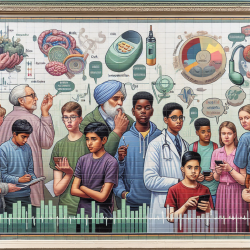The intersection of global trade and chronic disease is a burgeoning area of research that holds significant implications for various sectors, including online therapy services provided by companies like TinyEYE. A comprehensive understanding of these dynamics can empower practitioners to refine their skills and contribute meaningfully to the health outcomes of students they serve.
Understanding the Link Between Global Trade and Chronic Disease
The research article "Framing International Trade and Chronic Disease" by Labonté et al. (2011) provides a framework that connects global trade with the rise of chronic diseases in low and middle-income countries (LMICs). This linkage is primarily due to the diffusion of unhealthy lifestyles and products such as unhealthy diets, alcohol, and tobacco. These factors pose significant challenges to countries already burdened with communicable diseases.
The framework developed in the study identifies specific 'product pathways' that can be utilized by health policymakers to engage with trade policymakers. For online therapy practitioners, understanding these pathways can be instrumental in addressing the broader determinants of health that affect students' well-being.
Applying Research Insights to Online Therapy Practices
Online therapy practitioners can leverage insights from this research in several ways:
- Holistic Health Approach: Incorporate discussions on lifestyle choices and their long-term impacts into therapy sessions. Educate students about the influence of global trade on their health choices.
- Policy Advocacy: Engage with school administrators and policymakers to advocate for healthier food options in school cafeterias and limit exposure to unhealthy products.
- Cultural Sensitivity: Recognize the cultural dimensions of students' dietary habits influenced by global trade. Tailor interventions that respect cultural preferences while promoting healthier choices.
The Role of Online Therapy in Addressing Chronic Disease Risk Factors
TinyEYE's online therapy services are uniquely positioned to address some of the risk factors associated with chronic diseases. By integrating technology with therapeutic practices, therapists can offer personalized interventions that consider the socio-economic and cultural contexts of students.
Nutritional Counseling: Collaborate with nutritionists to provide workshops or resources on healthy eating habits tailored to the cultural backgrounds of students.
Mental Health Support: Address stress-related issues that may arise from economic insecurities linked to global trade dynamics. Provide coping strategies and resilience-building exercises.
The Importance of Continued Research and Collaboration
The findings from Labonté et al.'s research underscore the need for continued exploration into how global trade affects health patterns. Online therapy practitioners are encouraged to stay informed about these developments through conferences, webinars, and publications.
Networking Opportunities: Participate in interdisciplinary forums where health professionals and trade experts share insights. This collaboration can lead to innovative solutions that enhance therapy outcomes.
A Call to Action for Practitioners
The integration of global trade insights into online therapy practices is not just beneficial but necessary for addressing the complex health challenges faced by students today. Practitioners are urged to adopt a proactive approach by incorporating these insights into their daily practice and advocating for policies that prioritize student health.










